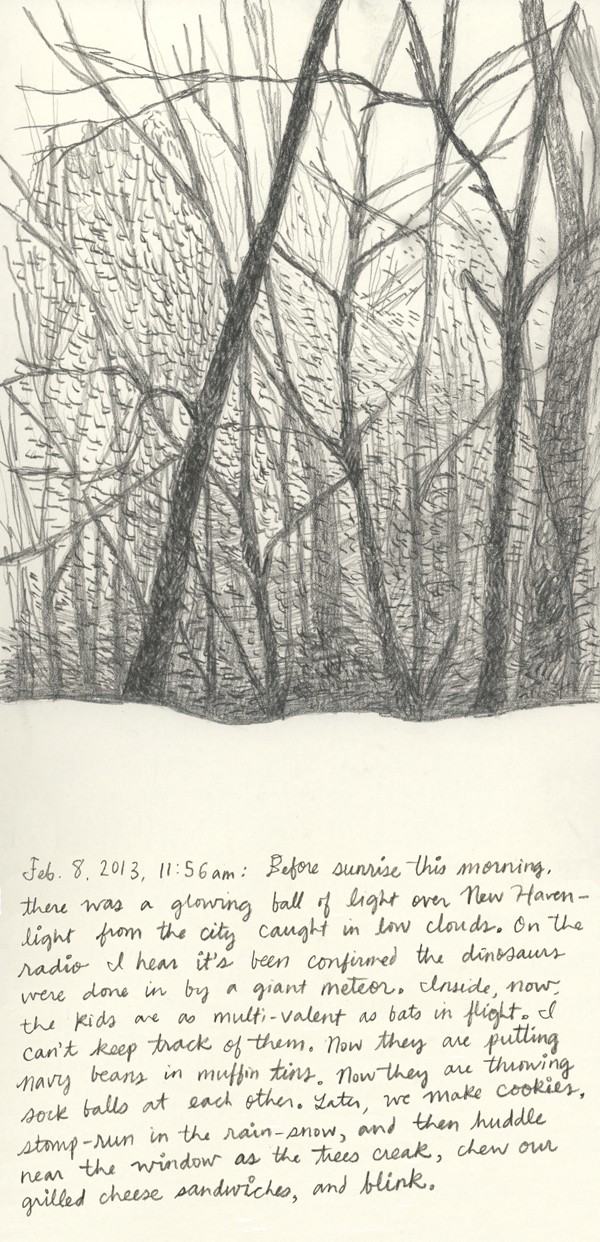Lipa Schmeltzer, The Hasidic Jew Who Makes Hilarious, Magic Music Videos
Lipa Schmeltzer, The Hasidic Jew Who Makes Hilarious, Magic Music Videos
by Esther C. Werdiger

It’s worth mentioning how I first heard about Lipa Schmeltzer — from my grandparents. They’d just flown back to Melbourne from a visit to New York, where they’d attended a wedding made by the Flatbush contingent of my extended family. The groom, my second cousin, was my age, and the wedding was a particularly extravagant affair. My grandparents were raving about how 1. the event featured a bar made entirely of ice, and 2. someone called Lipa Schmeltzer had performed for the guests. “He had a song all about diets!” exclaimed my grandfather. “How did it go, Nechama?” he asked my grandmother, both of them laughing. That was a number of years ago; the couple who were married now have three children. Schmeltzer didn’t cross my mind again until about a year ago, when I clicked the link to one of his music videos, “Hang Up The Phone,” on YouTube that a friend had posted, possibly ironically, on Facebook.
Lipa Schmeltzer is a straight-up Hasidic Jew. He’s in his mid-30s. His English is bizarrely accented, typical of Jews from New Square, a Yiddish-speaking community founded in the 1950s by Hungarian Hasidim up in Rockland County, New York. He has short, curly peyos and favors goofy eyeglasses, often switching between multiple pairs within the same music video — a Hasidic costume change, if you will. (I’ve always joked about how glasses are where very Orthodox Jewish men can really go nuts.) He’s married with children. He tweets, mostly to thank people for picking him up from the airport, or to show a picture of him on skis, or of him at a shiva visit (“shiva call at the Schnitzler’s”). Unlike the success story of Jewish-Reggae crossover star Matisyahu, I cannot imagine Schmeltzer ever having a shard of appeal outside the world of Jewish music. And yet he’s the best thing to happen to popular Jewish music in a long time.
***
Jewish music: an actual genre. I was never much of a fan. Despite my own religious (okay: alt-Hasidic) upbringing, I was raised on a normal musical diet; Van Morrison in my bearded dad’s car, AC/DC and Robert Palmer in my bewigged mother’s, the nightly Hot 30 countdown on the small yellow bat-mitzvah gifted radio in my room, except on Friday nights. I had friends whose parents didn’t allow secular music into their homes, but neither of my parents seemed to really care for Jewish music. So much of it was missing something, sexiness, most likely, and a lot of it was boring. I never wanted to listen to something that wasn’t GOOD, and even though, in some circles, choosing to listen to Jewish music is a moral choice, I could never subscribe to a double standard wherein I listened to something solely because it was Jewish.
There were a few exceptions, obviously. One of them was Shlock Rock. Formed in the mid-80s, and apparently still active today, the New York-based group has released some 34 albums. Their website informs me they’re currently on their “Tu Bishvat/Superbowl Tour.” Their shtick is to cover popular songs and substitute their lyrics with Jewish-themed ones. Chuck Berry’s “Johnny B. Goode” becomes “Learning is Good.” The Association’s “Windy” becomes “Rashi” (Rashi was an 11th-century Torah commentator in France: Whose three daughters married great scholars? / Everyone knows it’s Ra-shi, etc.) Lionel Ritchie’s “All Night Long” becomes “All Night Long,” which is a song about the custom of learning Torah for the entire night of the Jewish holiday Shavuot. The Beatles’ “Back in The U.S.S.R.” becomes “Leaving The U.S.S.R,” and is about the fall of the Iron Curtain and the subsequent departure of oppressed Russian Jews who hadn’t been able to practice their faith. Even now, when I hear George Harrison’s “Got My Mind Set On You,” I will often sing the Shlock Rock version, “I’ve Got My Own Seder Too.” It’s gonna take matzaaaah…
***
As you might expect, a number of genres exist under the Jewish music umbrella. The 70s ushered in its own folk scene, popularized by people like the late, great hippie/rabbi hybrid Shlomo Carlebach (“he called me neshoma’leh [rough translation: little soul],” my grandmother will tell you, with a blush). There are the clean-shaved Mormon-faced Yeshiva University boys who comprise the squeaky-clean YouTube friendly a cappella group The Maccabeats. Most Orthodox tween girls (and a few boys, I’m sure) have a crush on at least one Maccabeat, and it’s funny how even in this strange and chaste little world, people will still find something to swoon about. And then there’s the really frum (the word Orthodox Jews often use to describe their way of life) music — truly its own, mildly time-warped, and often bizarre entity. The frummer someone is, the less likely it is that they will listen to secular music, so current pop music trends rarely make it over the threshold to the musical shtetl. For the longest time, frum music had a distinctly schmaltzy, overproduced sound; every upbeat song had a sort of Latin-sounding horn section (often these become popular wedding songs), and every one of the sadder songs (think yearnings for the Messiah, lamenting historical tragedies, etc.) had an entire string section. Strict Jewish law prohibits men from hearing women sing (lest they have impure thoughts, bless them all), so it’s a fairly male-dominated scene, complete with boy choirs, or duets between grown men and young boys, who sing the high parts. The songs are not about sex or romance or love. They are about Shabbos.
There are a handful of people who dominate the little corner that is, basically, “contemporary Hasidic music,” most of whom reside in New York and sustain long careers releasing records through tiny labels, and occasionally performing to very large audiences, often sharing the stage with each other. There isn’t a lot of competition, and the music is so dated that it never really dates, showing up at every Orthodox wedding or bar mitzvah, in perpetuity. One of the godfathers of the genre is a gentleman by the name of Mordechai Ben David (a relative of mine, actually, although we remain unacquainted), who essentially invented the contemporary Hasidic genre in the 70s. People have always loved MBD, as he’s affectionately known. Just watching some songs on YouTube, I’m amazed and embarrassed at how many I actually know, and not cursorily. He’s in his 60s now and he’s still revered, wholesome and gracious as ever. There’s none of this crises-of-faith-via-Twitter business
we saw with Matisyahu, whose beard-shaving episode and decision to leave Orthodoxy still has some people feeling super bummed.
***
Regardless of his audience’s non-exposure to secular culture, Lipa is truly a Hasidic pop star in the Lady Gaga-era; a generous, gracious, and outrageous self-made showman. What sets him apart is a persona that manages to seem incredibly adventurous and creative, while still remaining traditional. His employment of rapping (often switching between English and Yiddish), samples, beats, Michael Jackson-like vocal affectations, silver face paint, like-nobody’s-watching dance moves — these are all things that could make him ripe for ridicule. But they don’t. They just seem brave, and awesome.
His music videos are weird, funny and most importantly, good, even if they do feature songs about how Jews should use their cell phones less and instead spend more time with their families and/or God (“Hang Up The Phone,” presumably a sort of response to Gaga’s “Telephone” video. Sample lyric: everyone is phoning / to the wall I’m talking / my friend’s with his Bluetooth / together when we are walking). The videos feature extended intros, narratives, and costumed dancers executing choreographed dance routines — all his dancers are noticeably religious men, and if you’re literate in frum, you’ll notice that all the men are different kinds of religious men; even if Lipa is just for the Jews, he’s for ALL Jews. Even me, kinda, it turns out.
Doesn’t the montage of Lipa performing, Lipa mingling with fans, Lipa dancing (albeit a bastardized Macarena) and Lipa just hangin’ out remind you of Robyn’s “Hang With Me” video? If it were set in downtown Jerusalem, let’s say, and Robyn was a slightly paunchy Hasidic man who wasn’t so much a good dancer as a person who just really loves to dance. It’s in Hebrew (sorry), but here is the entire song, translated: east, west, up, down, north, south / those of us who were pushed away will come together / from all four corners of the world.
And here’s the aforementioned “Hang Up the Phone,” featuring Lipa and his all-male crew as androids, after hours at a Boro Park electronics store. Silver-faced Lipa rhymes ‘Google’ with ‘kugel’, and ‘e-mail’ with ‘himmel.’
Like most of the fun stuff in pop today — the “Call Me Maybe”s, the “I Love It”s — Lipa’s songs are best enjoyed by ears listening both earnestly and ironically. For especially sheltered audiences who don’t know about goofy music videos, Lady Gaga, or Elton John and his wacky glasses, these are some good songs. For people who do know about all those things, here are some great songs, and isn’t it fun how there’s some weird Hasidic guy behind it all.
Wikipedia tells me that, currently, Lipa is pursuing a dual associate’s degree in performing arts and liberal arts at Rockland Community College. Nobody from New Square goes to college, let alone finishes high school. They go to yeshiva. For reasons like this, Lipa occasionally receives sideways glances from some members of the Hasidic community. It’s behavior that’s modern, and modern behavior poses a threat any insular religious community so invested in preserving its own purity. There’s a fear of anything new, or of anything that’s difficult to categorize.
In 2008, days before Schmeltzer was scheduled to perform at Madison Square Garden, a full-page ad appeared in the biggest Haredi newspaper, stating that, according to a number of rabbis, it was forbidden to attend the show. No reasons were given. Lipa made a quick decision to cancel the event, costing the financiers $700,000. Not only was the origin of the ad never discovered, but it seemed that a number of the rabbis who had supposedly signed the ad actually had no problem with Lipa. The ad was false, it seems, and probably the work of a recondite band of Hasidic thugs — some version of a self-appointed neighbourhood watch. They’ll never listen, but I’ll say it anyway. Guys, relax. Lipa Schmeltzer is good for you. Now dance.

Esther C. Werdigerlives in New York, works in marketing, produces a music podcast, and draws ‘The League of Ordinary Ladies’ comic series.
New York City, February 7, 2013

★ The northern sky had a rim of pale orange at dawn, and the orange stayed there well into daylight. Down in the construction pit, a big Deere excavator was turning over dark, damp earth below the dry tan surface. The sun glared through white-gray cover. When the air stirred, the cold hurt. By night, the chill had softened, but no one was noticing the weather at hand anymore. The Fairway was even by Fairway standards a seething, out-of-control mass of anxiety, sprinkled generously with a provoking, helpless passivity.
"House of Cards," Episodes 4-8: Who's Making Themselves Available?
“House of Cards,” Episodes 4–8: Who’s Making Themselves Available?
by Jane Hu and Carrie Frye
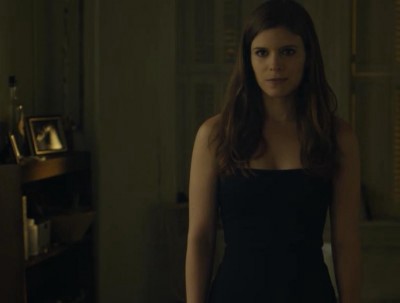
Carrie: Jane, remember when the world was new, you were dewy-eyed and I was not yet so haggard, and “House of Cards” had only just become available for streaming on Netflix? It seems like years ago, but it was only last Friday.
Jane: Now it’s a week later, Spandau Ballet’s “True” is playing in this cafe, and if we were sitting together, I’d probably be telling you not to Bogart the whiskey. We’ve passed binge-viewing, Carrie, to re-watching, to you using “House of Cards” characters as verbs (“how much will I Peter Russo myself in the morning if I do this?”), to me looking up which of the series’ actors originated in Broadway (hi, Seb Arcelus). If Netflix was looking for commitment, they certainly got it from us.
Carrie: As with the discussion of episodes 1–3, spoilers will run free for any plot developments through the end of episode 8 but no further. Because there’s so much ground to cover, let’s take it episode by episode. And in honor of all the sex in these episodes (both fun and terribly, handjobbily dejected), we’ll pick best come-on lines for each episode.
EPISODE 4
Worst come-on: “Do your parents know you live like this?”
Worst come-on runner-up: “Then you know [older men] hurt you, and after they hurt you, they discard you.”
Best Frankism: “Well, this is a surprise. You usually text.”
Best Frankism runner-up: “You see, Freddy believes that if a fridge falls off a minivan, you better swerve out of its way. I believe it’s the fridge’s job to swerve out of mine.”
Carrie: Let’s talk about Claire! You’ve mentioned that in the original British version of the series the wife doesn’t play a large part; in the US version, though, she’s a major force, and her importance as Frank’s partner is quickly established. Although in the first few episodes she’s very enigmatic — she jogs (a lot!); she lays off half her staff; she casts rueful glances at older Starbucks cashiers; she insists her husband use a rowing machine. All of this happens before it’s yet been established whether she’s a “nice woman,” that is, a sympathetic one. I admit, I don’t care about Claire’s charity (it seems to involve a lot of file folders); but I appreciated the ambiguity that hangs over her “niceness” when she was ordering the layoffs. Her office manager pleads with her; she cuts her off and then lets her go, too, and the manager departs in tears. One of the saddest exits by a cardigan I’ve seen in a long time. This show is interested in posterity and what lasts, and the natural corollary there is obsolescence and what doesn’t. So we see it with the office manager’s being fired at 59; and with Janine Skorsky, the 40-something reporter, watching Zoe do her first TV interview; Zoe’s being offered a job as White House correspondent that “would have been exciting when I was in 9th grade”; and Claire’s push to move her charity forward.
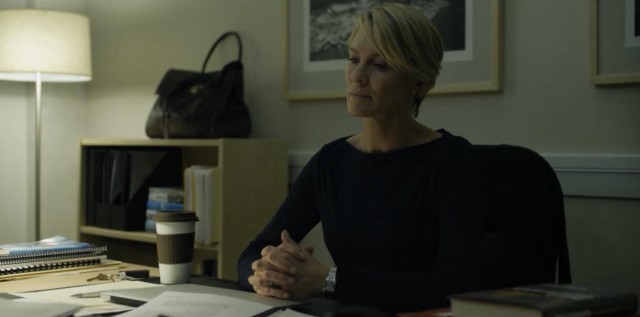
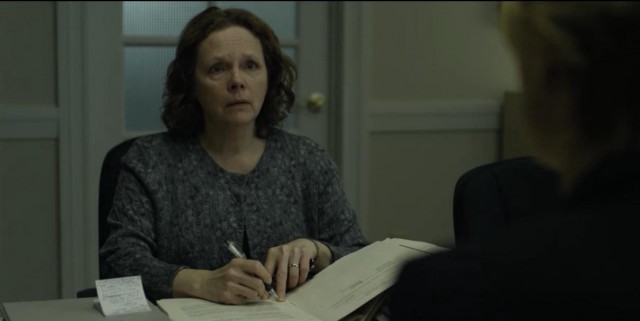
Jane: I’ve heard many people praise the BBC version above David Fincher’s (a common complaint: Fincher takes himself too seriously), but seeing as the American “House of Cards” expanded the wife’s role, as well as managed to get Robin Wright to portray it, it’s hard for me to watch the original now and not feel the lack. Unlike Eizabeth Urquhart, Claire Underwood not only gets much more screen time, but she actually gets something her husband rarely does in both versions: time spent on her interiority. That enigmatic quality about Claire you mentioned during the first episodes begins to pay off in the later ones, as her own narrative presence grows. Even when she pulls ruthless business moves (like firing the aging cardigan), we see her grapple with the emotional consequences (like look woefully at an older barista struggle with the till). Like Zoe, there’s a humanness to Claire, lying just below that glacial exterior. If we see Zoe and Claire as unbelievable female characters in their otherwise cold stoicness, we should remember that culture is filled with near-impossible superhero men, so why not spread the power around?
Carrie: Which reminds me of this great line from Willa Paskin, which you pointed out to me: “Zoe is so unencumbered by anxiety and fear and so flush with ambition that the least plausible thing about her — and she is not at all plausible — is that she would have pursued a career in print journalism.”
Interestingly, for being so ambitious, Claire and Zoe both let Frank bully them into giving up something in this episode: Claire gives up the donation offered by Remy, and Zoe makes herself “available” to Frank by turning down the White House correspondent position (and getting fired from the paper). In return, Claire gets some fundraising help from Frank, and Zoe gets a late-night visit at her apartment (insert House Whip joke here).
Jane: We learn from the show’s opening scene that Frank has some damning animal impulses, but they’re paired with human incentives. Frank can predict almost universally how those around him will react, and his plots depend on when and how he’ll trigger them. He scans the entire playing field (like Abu Nazir, Frank’s playing the long game, or that’s what I’d like to think, being as paranoid about all this as the character Carrie might) and then waits for his opponents to fall in line. Claire and Zoe aren’t exempted from the game. “House of Cards” is about the fantasy of control, where Frank Underwood delivers a line explaining the maneuvers leading up to a checkmate (“It feels like I’m in a 26 hour championship chess match,” says Spacey in a Fresh Air interview) and the scene immediately follows to demonstrate said conquest. Is it frustrating, this need of Frank to show off his orchestrations? If I were Claire and Frank direct-addressed-aka-lectured me all the time, I might find it galling.
Carrie: Claire’s emotional revenge for this is reaching out to her photographer-lover Adam whenever she’s mad at or feeling alienated from Frank. And there’s a nice progression in this episode in our understanding of her and Frank’s marriage. We know he senses that there’s something going on between her and Adam, but we don’t know if that’s a clandestine understanding (i.e., when you just sense your partner is tempted) until the very end of the episode, when her previous affair with Adam is acknowledged between them. So it’s the first sense that their marriage is unconventional in its candidness and arrangements.
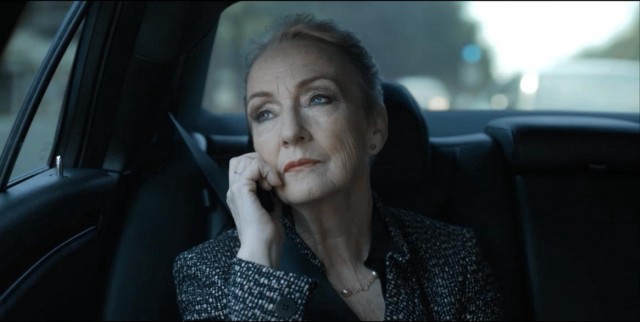
Favorite minor characters: Janine Skorsky, who really knows how to make resentment work for her. God, that exchange with Zoe, which includes lines like: “You’ve been gunning for my job since the day you bounced in here with a lollipop in your mouth.” And: “I’ll send you a bottle of champagne from the middle west, wherever the fuck that is.” Also loved: Kathleen Chaflant as the Washington Herald’s Katherine Graham-like publisher, who has a great way with a “cunt” delivery line (although it’s unfortunate for her editor Tom that he then deploys the word in a conference with Zoe).
Random aside: Adam the photographer is to Claire what Dominik the painter is to Victoria Grayson on “Revenge.” Who is the better lover-artist-paramour? Discuss.
EPISODE 5
Worst come-on: “People are interested. I’m one of them. But if eight minutes passes on anything, I get bored. In eight minutes I could be bored with you unless you keep me interested. I think you can.”
Worst come-on runner-up: “It’s your call. I won’t chase you.”
Best Frankism: “I’ve been feeding you plenty.”
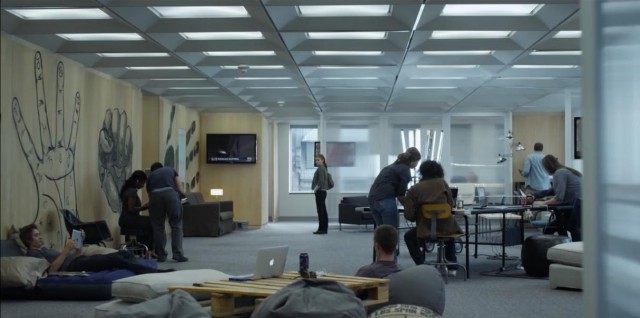
Jane: When Zoe describes Slugline to Frank at the start of this episode and he responds with, “If freedom and exposure are what they’re offering, I would say that is a meeting worth taking” he sounded SO OLD. But then I saw Slugline and I felt so old. First, brava, Slugline for having headquarters (spacious too!) but I’m not exactly sure what publication inspired all this (at least the one from Facebook had desks). Giant fists as wall art! Scattered rolling chairs! No partitions! Macs Macs Macs! Long batons of what seem to be LED lighting sit bunched together in crates throughout the room. Am I looking at the future?
The site’s editor-owner Carly Heath tells Zoe that they’ve only been there for three months, but I… don’t love what they did with the place. A girl sips Red Bull, sitting on what appears to be two pillows, hunched over a low-set coffee table. Carrie, I’m concerned for everyone’s backs here! It might embody freedom architecturally, but this just isn’t wise orthopedically. There don’t seem to be actual desks, unless the ping-pong table counts (I shouldn’t talk — I’m currently sharing a large wooden table with five other millennials in a Berkeley cafe; there’s a large-screen TV in the corner, many chandeliers, vegan donuts). Wait, am I working for Slugline? Please advise. Is The Awl taking notes?
Carrie: It’s funny, as I was watching, I was of course thinking about this and wondering if those pillow chairs, while an obvious chiropractic nightmare, might be helpful with circulation (because of having your legs elevated?). (Oh internet-worker ergonomics: maybe the ideal work environment will someday be bloggers in gravity boots strung upside down from the ceiling, rows upon rows of them. It would at least be back lengthening.)
Although I did appreciate the Slugline editor’s breezy Socratic approach to the editing process, wherein you don’t edit at all but empower the writer to think about whether the copy she’s turned in is good enough, until she decides: “No, I can do better.” And then you say: “Feel free to blow my mind” and walk off. (I hear William Shawn used the exact same line on Benchley.)
Also: “Slugline.” Slug. Line. “I work at Slugline.”
Jane: Maybe this is the difference between reporting and cultural criticism: one doesn’t require an editor. Um.
Fact: it is really difficult to write on an iPad and would cut into posting time significantly, yet Slugline sure has a lot of twenty-somethings writing on iPads. UNREALISTIC HOC POINT #56346. Then again, Zoe writes her gala piece using a phone while riding the bus, so who’s to say. Is Slugline trying to make writing look easy? Because mostly it just reminded me of what a slow writer I am. ON A BUS RIDE? How big is D.C.?
Carrie: Here is how the show’s writer Beau Willimon explained the name to Poynter (thank goodness someone made the show comment): “’Slug’ is a journalistic term with play on deadline. Also the ‘slug’ is what you call the locale and time of a scene in a screenplay, i.e. INT — OVAL OFFICE — DAY. And finally, we liked the pugilistic connotation of slug as in I slugged him in the face.”
I wish he had added, “Also, we hear it’s freaking impossible to find good, short available domains these days.” Jane, I’m glad we got to the bottom of this very important issue. Slug. Line.
Favorite minor character: Union lobbyist Marty Spinella, who has been leading the protest against Frank’s education reform bill. Marty’s spastic movements (so many cellphones were needlessly destroyed in this episode) and yelling feel so out of place in this show: “You fuck me; I fuck back!” Also this multi-level insult:
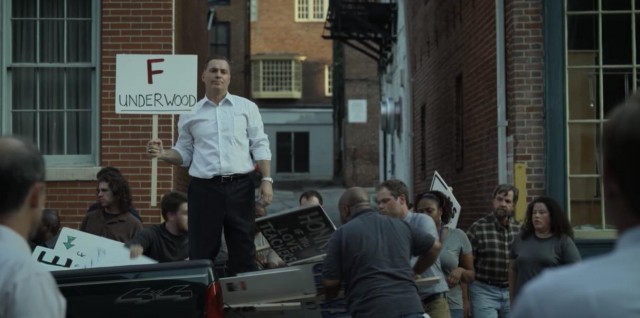
Random aside: Favorite “Related” headline linked to from that Poynter article: “Actress Kate Mara did not talk to reporters for the role.”
EPISODE 6
Worst come-on: “This is work, not play.”
Worst come-on runner-up: “I was hoping you’d answer the door naked.”
Best Frankism: “You and I; education.”
Best Frankism runner-up: “U think I O U a Apology? But nonono, U O I.”
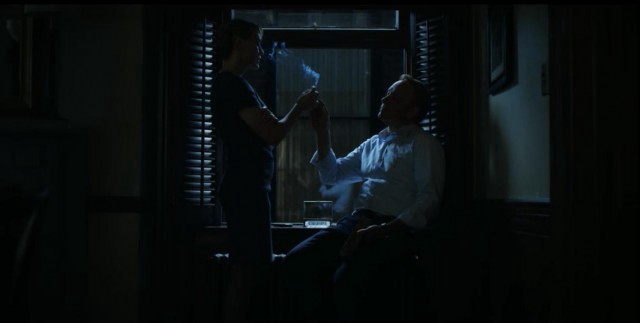
Jane: Even though it ends with Claire and Frank smoking at their usual window perch, the growing rift between them really shows in this episode. Around the halfway point:
Claire: “I love you, Francis.”
Frank: “I know.”
Claire: “We should say that more often to each other.”
Frank: “I need to clear my head.”
Oof. I also love that “to clear my head” for Frank means shine my very many dress shoes.
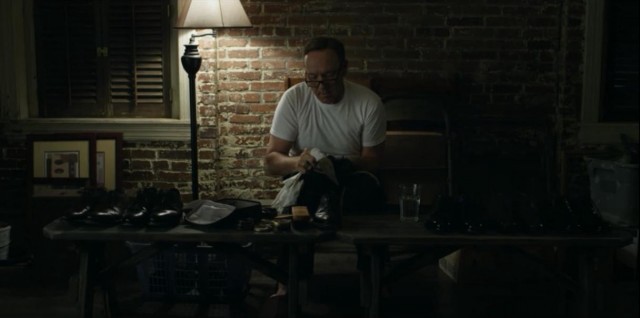
As Frank pulls away from Claire, Adam continues to draw near, calling her after the brick incident and so giving them another chance to resume their circuitous will they won’t they. Then there’s Frank’s old guard Steve, who Claire has been visiting since learning about his fatal condition. (Note that all the “feminine” work of hospice care is left for Claire to deal with alone, even though the person whom Steve actually worked for is Frank. Somewhere her ex-office manager is sensing cosmic retribution.) Claire’s last visit, though, involves some big character reveals.
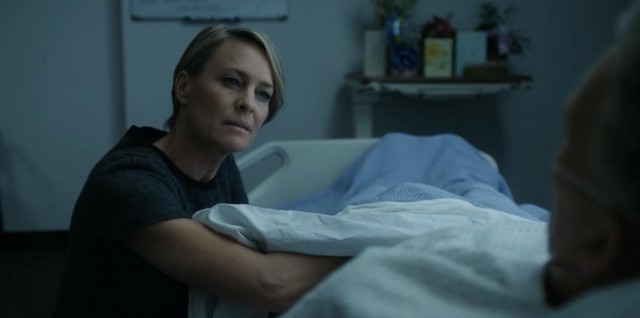
Carrie: The unsolicited handjob Claire starts to give Steve when he’s in the hospital bed, the most disquieting, unerotic handjob scene since The Master? (There should be a listicle.) It’s such a shocking moment; she’s like an animal striking suddenly when she crouches by the bed. It’s sad, contemptuous, confusing. Poor Steve! “Thanks for making a declaration of your essential strangeness as I was dying. I appreciated that opportunity to see your truth!”
Frank and she are growing apart here; it’s telling that his recognition that he’s using her makes him flub so badly during the CNN debate. VERY uncharacteristic of Frank.
Favorite minor character: Poor ingratiating Meacham! Is this the last time we’ll see him? Especially after being told by the man who just got him his job back: “You are a rock: you absorb nothing, you say nothing, and nothing breaks you.” Frankisms FTW.
Random aside: The autotuning of Frank’s CNN gaffe is a reminder of how “Bunheads” hilariously did the same last year.
EPISODE 7
Worst come-on: “Your place, this evening, and I’ll text you when I’m about to arrive.”
Worst come-on runner-up: “But you’re the one with the congressman.”
Best Frankism: “What’s going on with all the little sculptures?”
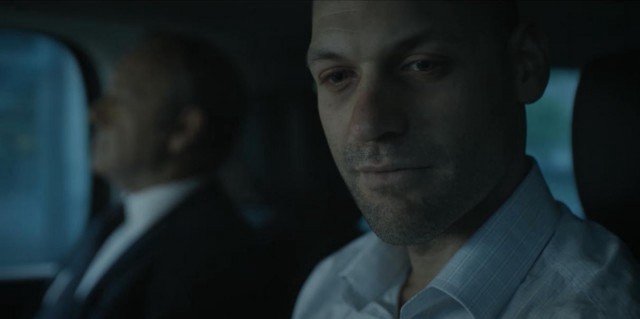
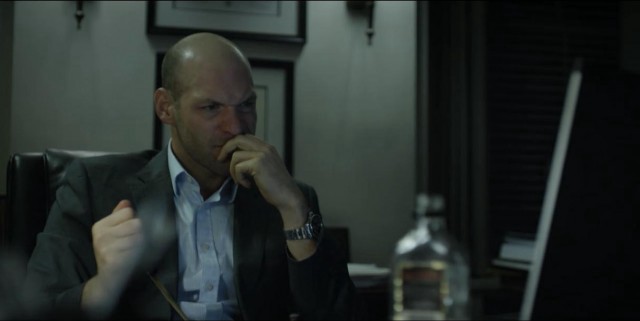
Jane: I can’t believe we’ve come this far without discussing Peter Russo, played oh-so-marvelously by Corey Stoll (who seems to have been typecast as he who loves drink). Russo: the working-class Philly native that made it to D.C. politics via his sway with the people back home, but has since fallen from their good graces after following Frank’s orders, which gets thousands of them laid off. Classic Frank move. While Russo does have his issues (mostly coke-, alcohol-, prostitution-related) that make him as a liability for any role in D.C. government, it is exactly these liabilities that Frank capitalizes on and manipulates to present Russo as a contender for the next governor of Philadelphia. Lots of confusion and drama ensue, especially as Frank’s team works to clean up Russo’s image.
Randy: “The narrative has to be redemption. A phoenix from the ashes.”
Frank: “Well let’s not focus on the ashes. We don’t want people to think Peter was a disaster.
All the while, a tortured, puppy-eyed Russo sits in the corner, looking unconvinced. But I would vote for Russo! He’s like the realest thing on “House of Cards,” but do the people know that?
Carrie: RUSSO!! He fucks up so many times in such enormously self-defeating ways and yet… I still feel such a liking for him (also: would happily spend a night in his gray, hotel-suite-ish, Sharper Image condo). He’s cowardly, loyal, disloyal, furiously-appetited, funny. Credit to Stoll for keeping that sympathy brewing.
Jane: It’s so easy to love Peter, especially since Frank keeps reminding us that Peter’s whole story revolves around heart (redemption; of the people; one for the home team!) and heart (Frank understands that everyone’s soft spot lies in who they love). Peter’s ex, Christina (the show’s most likeable character?) is pulled back into the plot after Frank convinces her that Peter needs her to run this race. Christina and Peter meet for the first time since their breakup in Frank’s home. Do you think Frank could get me a date?
Carrie: I suspect that Frank doesn’t match-make with the best intentions! I had forgotten that that reunion happens in Frank and Claire’s house, but then of course it does. Frank’s dominance over Russo is so intimate — take that scene where Frank orders him to take a bath the night he stays over at their house because he’s too drunk to go home. When Frank put the razor blade on the edge of the tub I wasn’t particularly surprised, either.
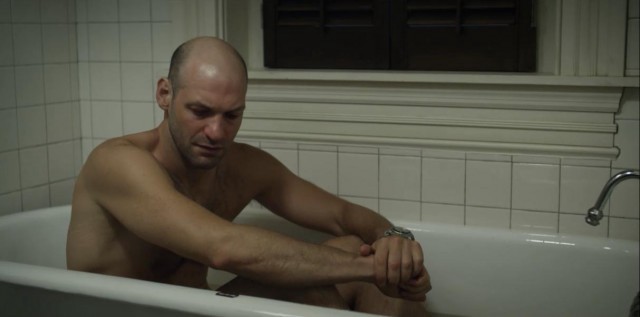
Favorite minor character: Lucas, who shows up “pretty wasted” outside Zoe’s apartment to profess his “deep, dark secret” of crushin’ on our girl.
Random aside: For all those cringing over the on-the-nose father-daughter dynamics between Zoe and Frank at the end of this episode (she talks to her father on the phone while Frank goes down on her — or “eating the peachoid” as they say in Gaffney), the original version had Matty (British Zoe) call Frank “daddy” during sex. Daddy being Ian Richardson in this case, of course.
EPISODE 8
Worst come-on: “So do I get a hotel?”
Worst come-on runner-up: “My heart is beating so fast…”
Best Frankism: Frank’s back with his college friends, and this is the most relaxed and sincere we’ve seen him. As such, there are no classic Machiavellian metaphors by Frank in this episode; only saccharine ones about “harmony” and being “more than brothers.”
Carrie: In episode 3, Frank travels back to his hometown of Gaffney to solve the Peachoid crisis; in this one, he goes back to the Sentinel, the Citadel-like military college where he spent his undergrad years. The two biographical episodes parallel nicely, each giving us a little more insight into who Frank was at different stages of his life. And he is so happy in this episode, Jane! With his three good friends to carouse with and his radiant wife beside him, with the library being named after him and the success of the education bill having just passed. Did you notice how little direct address there was to the camera in this one? That’s how happy he was — he didn’t have to self-narrate.
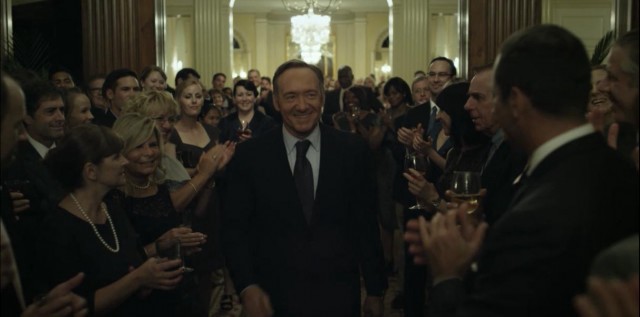
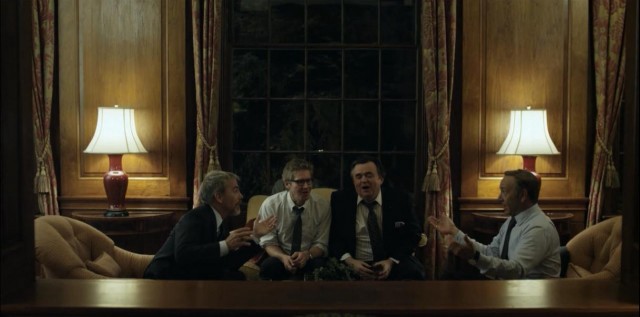
Jane: Happy Frank also sings a lot. A round of “Oh Shenandoah”? Don’t mind if you do. Against BBC, Fincher’s “House of Cards” makes detours to examine Frank’s past — something television narratives don’t always spend time on. But no one comes fully formed, especially not so fully rock-like as our Frank. (I loved the discussion of “Frank” vs. “Francis” he has with his friend, and how the name chosen to adorn the monument would be the one almost never used.) As shown by that wacky episode of “Girls”, taking the protagonist to the actual site of his origins and growth is even more unusual (credit to how Fincher spent his $100 million). In this episode, almost everyone returns to confront their history: Russo back to his old Philly friends and mother, Claire has an hour-long phone call with Adam while lounging in the bath, and Frank with his three cronies, who, unlike everyone else Frank spends his time with, seem like absolutely congenial chums. Despite their all-nighters together, can you see his lieutenant Stamper joining Frank in a drunken push-up competition? Can you see Frank letting him?
Carrie: That conversation with his best friend/former sleeping companion/Imzadi late at night was striking, in that Frank kept insisting on sincerity between them even while the friend kept giving him conversational outs. It didn’t seem a drunken thing, either.
Jane: Yes! You really felt how hungry Frank was to eke all the truth and intimacy he could in that moment. Watching The Social Network and “West Wing,” I thought it was Sorkin who was fixated on homosociality (and he is), but now it’s clear that Fincher is as well (I mean, of course, Fight Club!).That final moment between Frank and Imzadi was wrenching, and it’s one that becomes ever familiar with age: old friends who, even as they insist on visiting more often, already know that they never will. While Frank has loved his reunion, I think it only made clearer how far apart all these worlds are (that moment his friend gives him his card so Frank’s “money manager” can call him? Also heartwrenching). The turn at the very end, with Stamper, also indicates a change in pace. Jeff Beal’s music signals so much: back to D.C. and they’ll go through business on the car ride to the airport.
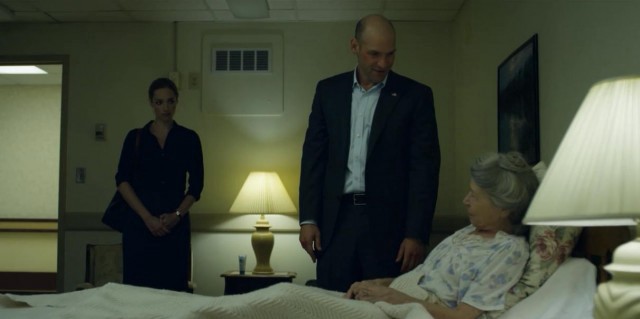
Favorite minor character: Hands down Russo’s mother, who is probably the most straightforward explanation for how Russo is so, well, Russo. She’s sharp, but tired of life, and when Russo works his way back into her good favor at the episode’s end, she says to Christine, “So you’re fucking my son?” That’s the Russo version of “Welcome to the family.”
Random aside: Frank and his friends as Frodo, Sam, Merry and Pippin. In this analogy, the friend who offers the business card is Pippin.
Previously: “House of Cards,” Episodes 1–3: Bloggers With Their Wine
Next: “House of Cards,” Episodes 9–13: The Ones Where Everything Goes Nuts
Jane Hu composed this on her phone. Carrie Frye Peter Russoed it in.
Let's All Conform, It Feels Good
“Caving in to social pressure — from something as simple as saying you love a movie because your friends do, to participating in criminal activity to cement membership in a gang — creates good feelings about being part of a group.”
Superstorm Nemo Eats Half of North America

You’re not going to escape this one. According to this NASA satellite photo, the best thing to do is buy ALL the booze and cigarettes and pizza and batteries from the very nearest bodega and then just hope to Christ that Netflix Streaming doesn’t go out. But it will go out, along with the power.
In positive news, it will be very beautiful after the storm. Just be careful not to step on frozen people and frozen stray pets, under the foot or three of fresh snow. What are your storm-coping tips?
Monetizing YouTube Animal Videos With Brief Pop Songs
If you’ve seen the opening credits for “Buffy the Vampire Slayer,” you’ve heard the music of Nerf Herder. The Santa Barbara “geek rock” band got its name from the scruffy alien Princess Leia pretends not to like in The Empire Strikes Back, and the group’s best known non-Buffy track was a novelty song about Van Halen. This was all part of a larger SoCal scene that shared members and shows and houses with The Rentals, Lagwagon, Weezer, Psoma, Ridel High, the Lapdancers, Popsicko and other such groups popular with the college-educated irony crowd. The late 1990s and early 2000s, everybody!
Since 2008, Nerf Herder’s Parry Gripp has also worked as a composer of short songs to accompany animal videos on YouTube. This is an actual job, in 2013, although Gripp says the big entertainment corporations are fast moving in on this previously DIY genre. How it works is when you write the music and have the rights to the video, YouTube pays you for views! It is a kind of magic. How many people have watched and listened to these videos? 88,479,703, as of today.
"Traditional Southern Diet" Will Put You In Traditional Southern Grave
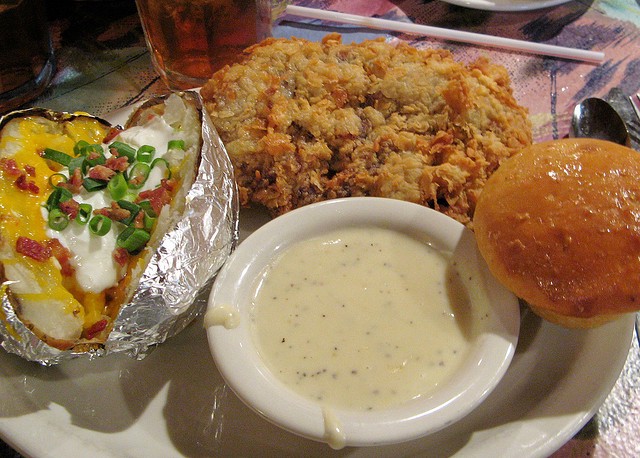
Fried chicken, ham, bacon, “sweet tea” and huge store-bought cakes are the five major food groups of the Southern United States, and there are apparently some health consequences to eating nothing but fat, lard, corn syrup and factory slaughtered antibiotic-filled pigs and chickens.
People who ate Southern food six times a week had a 41% higher risk of stroke, compared with people who ate such food once a month. And, the study found, a traditional Southern diet accounted for 63% of the higher risk of stroke among African Americans, compared with white Americans.
The study followed 20,000 white and black Americans who enjoy the “traditional Southern diet” of “fried chicken and fish, bacon, ham and sweet teas.” They were already expected to die from diabetes and heart attacks, but this is the first research to show they can also expect to die from strokes, obviously.
Photo by Randy OHC.
No Ice, Two Bucks
You know, if somebody charged me two dollars for not putting ice in my bourbon I don’t think I’d be able to manage the level of restraint this gentleman seemed to show. Of course, he turned it into a free drink, which is probably a valuable lesson in the importance of keeping calm.

